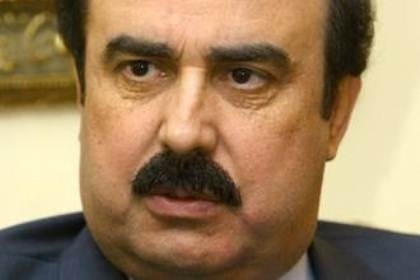Conflicting reports on the fate of Political Security Branch Cheif General Rustom Ghazali, after being dismissed from his position, raises concerns on the fate of the regime, which Ghazali served years ago in Lebanon. Just as the late Syrian president, Hafez al-Assad, had his own men (most immigrated, were exiled or killed after his death) the current president, Bashar, has his men; the most famous of which was Ghazali. After 15 years in power, as the wind blows against the current president, the strongest leaves on his tree fall one by one.
In the second half of last February, Ghazali appeared healthy on television justifying blowing up his palace in his hometown of Qarfa, southern Syria, because he did not want to turn it into a headquarters for the Iranian Revolutionary Guards, who incidentally became responsible for the conflict on behalf of the Syrian regime.
But this story has a sequel, as information suggests that the Syrian regime asked former chief economist in the government (and current official in ESCWA), Abdullah Dardari, to request a loan of 6 billion dollars from Tehran about a month ago. Tehran responded that the Islamic Republic has so far provided the regime in Damascus with about 20 billion dollars, and from now on, it will not lend more money without something in return. As it turns out, Iran wishes to control Syria; and so it was.
Information also suggests Tehran now owns hotels in the Syrian capital, in addition to Sayeda Zeinab shrine and thousands of hectares of land surrounding it. Despite these concessions, Dardari returned from his visit with only one billion dollars out of the 6 billion Damascus requested.
The Assad government seems unable to control the internal conflicts that continue to destabilize the regime, especially one most recently between Ghazali and Military Intelligence Chief Rafiq Shehadeh. While attention is focused on what happened between the two, it is well known that tensions peaked when Ghazali denied the Iranian Revolutionary Guards a headquarters by burning his palace to the ground.
When a man renowned for his ferocity in serving the head of the regime is stabbed in the back, it could mean Assad is no longer capable of protecting his men from the heavy grip of Iran. Some visitors to the Syrian capital say that there are barriers in Damascus held by Iranian security, where Syrians obey their orders in order to pass.
Since 2000, Bashar Assad became a president who wished to govern Syria and Lebanon with men reflecting his personality. Between 2000-2005, Ghazali was his "terrible" man who dominated Lebanon. But between 2005-2015, Ghazali's mission was to join the Revolutionary Guards to dominate Syria. When he refused, they removed him. The Iranian guillotine will not only end the life of a man, but a whole regime.
Translated and edited by The Syrian Observer


